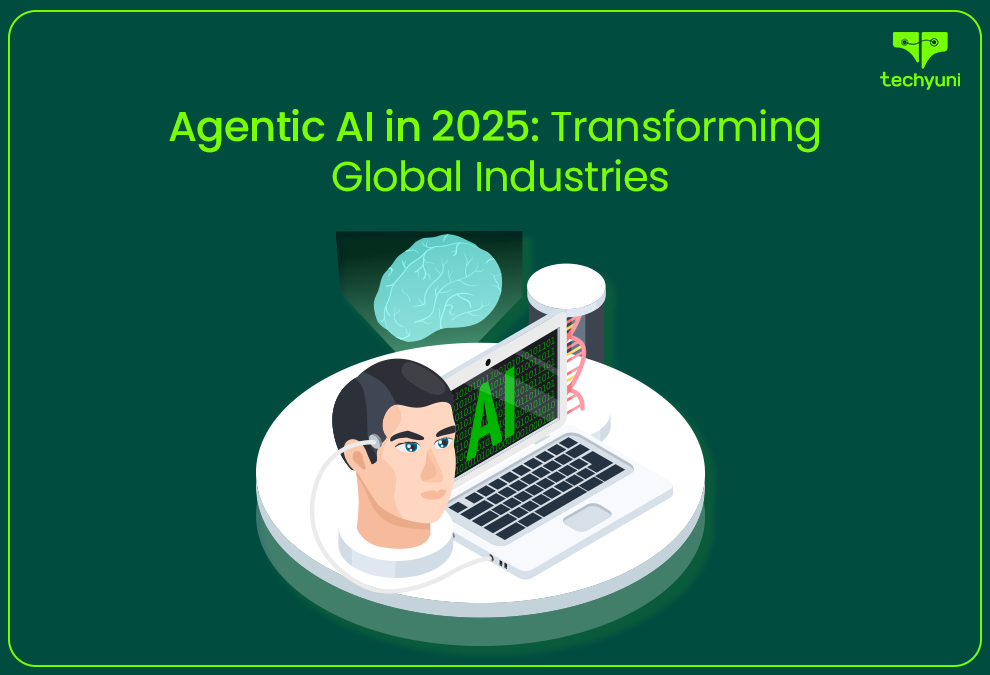
Agentic AI in 2025: The Game-Changer for Global Industries
Agentic AI is transforming industries in 2025, driving automation, efficiency, and smarter decision-making in healthcare, finance, and more.
Introduction
Artificial intelligence (AI) has already disrupted multiple industries, but 2025 marks the rise of Agentic AI, an advanced form of AI that goes beyond automation. Unlike traditional AI systems, which require human intervention at key decision points, This AI can think, learn, and act independently.
This groundbreaking technology is transforming industries by enhancing decision-making, optimizing processes, and adapting in real-time. As businesses embrace Agentic AI, they unlock higher efficiency, cost savings, and new revenue opportunities.
What is Agentic AI?
Agentic AI refers to intelligent systems capable of making decisions, adapting to new information, and optimizing tasks autonomously. Unlike traditional AI, which follows pre-defined rules and relies on human input, Agentic AI operates independently, learning from real-time data to improve performance over time.
Key Features of Agentic AI
-
Autonomous Decision-Making – Can process large datasets and make real-time, independent choices.
-
Adaptive Learning – Improves continuously by learning from past experiences and feedback loops.
-
Multi-Modal Processing – Understands and integrates text, images, voice, and other data formats.
-
Seamless Integration – Works smoothly with both digital and physical systems, enabling automation.
-
Proactive Problem-Solving – Anticipates challenges and takes action before human intervention is needed.
Industries Transformed by Agentic AI
Agentic AI is reshaping major industries by introducing intelligent automation, predictive insights, and real-time decision-making.
Healthcare: Smarter Diagnosis and Personalized Treatment
AI-driven healthcare solutions are improving patient care through:
-
Technology-driven imaging tools that detect diseases like cancer at an early stage.
-
Virtual health assistants that provide personalized health advice based on patient history.
-
AI-assisted robotic surgeries that enhance precision and reduce recovery time.
By analyzing extensive medical datasets, Agentic AI is helping doctors make faster and more accurate diagnoses.
Finance: Fraud Prevention and Automated Decision-Making
The financial industry relies on Agentic AI for risk management, fraud detection, and algorithmic trading.
-
AI-powered fraud detection can flag unusual transactions instantly, reducing financial crime.
-
Automated trading platforms adjust investment strategies in real-time based on market conditions.
-
Intelligent credit scoring systems assess loan eligibility with greater accuracy.
By leveraging AI-driven predictive analytics, financial institutions can mitigate risks and optimize investments.
Manufacturing: Smart Production and Predictive Maintenance
Manufacturers are using AI to automate production lines and reduce downtime with:
-
AI-driven monitoring systems that track factory equipment for early signs of malfunction.
-
Smart robots that improve precision in assembly lines.
-
Predictive maintenance models that optimize supply chains and prevent equipment failures.
These applications lead to higher productivity, lower costs, and improved operational efficiency.
Retail: Personalized Shopping and Inventory Optimization
Agentic AI is revolutionizing retail by enhancing customer experience and backend logistics.
-
AI-powered recommendation engines provide hyper-personalized shopping experiences.
-
Intelligent demand forecasting automates inventory restocking.
-
Smart checkout systems enable cashier-less shopping experiences.
By integrating AI-driven insights, retailers can increase sales, customer retention, and operational efficiency.
Transportation: Smart Mobility and Autonomous Vehicles
The transportation sector is undergoing a major transformation with self-driving technology and AI-driven logistics.
-
Autonomous vehicles use real-time data to navigate safely and efficiently.
-
Smart traffic management systems optimize signal timings to reduce congestion.
-
AI-driven logistics platforms optimize delivery routes, improving fuel efficiency and reducing costs.
These advancements are making transportation safer, smarter, and more sustainable.
Benefits of Agentic AI
The integration of Agentic AI across industries brings numerous advantages:
-
Increased Efficiency – Automates repetitive tasks, reducing workload and human error.
-
Cost Savings – Lowers operational expenses by optimizing processes.
-
Smarter Decision-Making – Leverages vast datasets to improve business strategies.
-
Improved Accuracy – Enhances precision in complex tasks such as medical diagnoses and financial forecasting.
-
Scalability – Adapts to multiple industries and business models.
-
Real-Time Adaptation – Adjusts dynamically to changing environments and conditions.
Challenges and Ethical Considerations
Despite its advantages, Agentic AI presents several challenges and ethical concerns:
1. Job Displacement
As automation takes over certain roles, industries must invest in workforce reskilling to prepare employees for AI-driven job markets.
2. AI Bias and Fairness
AI systems can inherit biases from training data, leading to unfair decision-making. Transparent AI governance and regulation are essential to mitigate bias.
3. Security Risks
Cyber threats targeting AI-driven systems pose significant risks. Strengthening AI security and data protection measures is critical.
4. Regulatory and Ethical Compliance
Governments must establish policies ensuring the responsible development and use of AI. Ethical AI frameworks should prioritize fairness, accountability, and transparency.
Future of Agentic AI: What to Expect in 2025 and Beyond
The future of Agentic AI is full of innovations that will further reshape industries.
Key AI Trends to Watch:
-
Advanced AI Assistants – AI-powered personal assistants will manage schedules, automate tasks, and enhance productivity.
-
Hyper-Personalization in Marketing – AI-driven advertising will tailor recommendations with extreme precision.
-
AI in Legal and Compliance – Automated systems will handle contracts, risk assessments, and regulatory compliance.
-
AI-Driven Cybersecurity – Real-time AI threat detection will prevent cyberattacks.
-
Decentralized AI Systems – Intelligent models will operate without relying on centralized cloud networks.
Companies that adopt AI responsibly will gain a competitive advantage in the digital economy.
Related: How AI-Powered Personal Assistants Are Changing Productivity
Conclusion
Agentic AI is revolutionizing industries by enhancing automation, decision-making, and efficiency. While it presents challenges, businesses that implement AI responsibly and ethically will lead in the future economy.To stay ahead of technological advancements, industries must embrace AI innovation while ensuring security, fairness, and ethical governance.